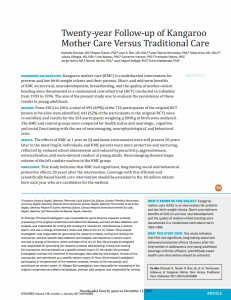
Originally published on AAP News & Journals
BACKGROUND AND OBJECTIVES: Kangaroo mother care (KMC) is a multifaceted intervention for preterm and low birth weight infants and their parents. Short- and mid-term benefits of KMC on survival, neurodevelopment, breastfeeding, and the quality of mother–infant bonding were documented in a randomized controlled trial (RCT) conducted in Colombia from 1993 to 1996. The aim of the present study was to evaluate the persistence of these results in young adulthood.
METHODS: From 2012 to 2014, a total of 494 (69%) of the 716 participants of the original RCT known to be alive were identified; 441 (62% of the participants in the original RCT) were re-enrolled, and results for the 264 participants weighing ≤1800 g at birth were analyzed. The KMC and control groups were compared for health status and neurologic, cognitive, and social functioning with the use of neuroimaging, neurophysiological, and behavioral tests.
RESULTS: The effects of KMC at 1 year on IQ and home environment were still present 20 years later in the most fragile individuals, and KMC parents were more protective and nurturing, reflected by reduced school absenteeism and reduced hyperactivity, aggressiveness, externalization, and socio-deviant conduct of young adults. Neuroimaging showed larger volume of the left caudate nucleus in the KMC group.
CONCLUSIONS: This study indicates that KMC had significant, long-lasting social and behavioral protective effects 20 years after the intervention. Coverage with this efficient and scientifically based health care intervention should be extended to the 18 million infants born each year who are candidates for the method.